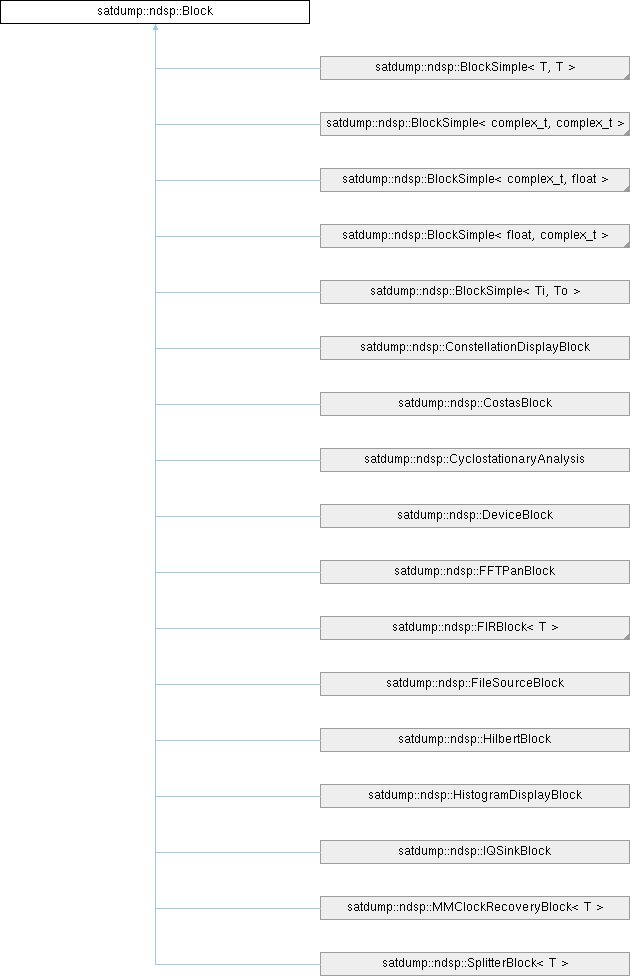|
| std::vector< BlockIO > | get_inputs () |
| | Get the block's input configurations and streams. You should not modify them.
|
| std::vector< BlockIO > | get_outputs () |
| | Get the block's output configurations and streams. You should not modify them.
|
| void | set_input (BlockIO f, int i) |
| | Link an input to an output stream of some sort. This also checks the type of the BlockIO to ensure (some level of) compatibility.
|
| BlockIO | get_output (int i, int nbuf) |
| | Get one of the block's outputs, creating the fifo it if nbuf != 0.
|
| void | link (Block *ptr, int output_index, int input_index, int nbuf) |
| | Link a block's output to another input, more or less just a warper around set_input and set_output.
|
| | Block (std::string id, std::vector< BlockIO > in={}, std::vector< BlockIO > out={}) |
| | Generic constructor, to be overloaded.
|
| virtual nlohmann::ordered_json | get_cfg_list () |
| | Get parameters LIST of the block's parameters. This does not contain actual values, only a description of what is available. This will contains a name, optionally description, its type and range if applicable, string options and so on. This must be re-pulled in several cases :
|
| virtual nlohmann::json | get_cfg (std::string key)=0 |
| | Get parameters of the block as JSON.
|
| nlohmann::json | get_cfg () |
| | Get parameters of the block as JSON. Unlike get_cfg(key), this returns every single available parameter as declared by get_cfg_list().
|
| virtual cfg_res_t | set_cfg (std::string key, nlohmann::json v)=0 |
| | Set parameters of the block from JSON, including potentially IO configurations for blocks that may have variable output sizes. However, you likely should implemenet that in a separate function as well (eg, addVFO or such) for it to be easy to be done in C++ directly, and using said function here. Optionally, this can also be made to be functional while the block is running!
|
| cfg_res_t | set_cfg (nlohmann::json v) |
| | Set parameters of the block from JSON. Essentially the same as set_cfg(key, v), except this will set any number of them at once.
|
| virtual void | start () |
| | Starts this block's internal thread and loop.
|
| virtual void | stop (bool stop_now=false) |
| | Stops the block, or rather tells the internal loop it should exit & joins the thread to wait. TODOREWORK, potentially allow sending the terminator as well to force-quit.
|
Base Block class.
This has several goals :
- First this simply provides an easy-to-use base to implement most DSP blocks, with inputs/outputs passing pointers around, as well as an internal thread to run the actual loop,
- Secondly, unlike the previous system this class' interface alone is meant to be enough to perform ALL block functions, from configurations to starting/stopping and so on, as well as entirely abstracting types used in IO streams.
See each function's documentation for more information!
- Parameters
-
| d_id | the block's ID |
| inputs | the block's inputs |
| outputs | the block's outputs |
| virtual nlohmann::ordered_json satdump::ndsp::Block::get_cfg_list |
( |
| ) |
|
|
inlinevirtual |
Get parameters LIST of the block's parameters. This does not contain actual values, only a description of what is available. This will contains a name, optionally description, its type and range if applicable, string options and so on. This must be re-pulled in several cases :
- If set_cfg returns RES_LISTUPD or higher
- If the block is started
- If the block is stopped
- Returns
- parameters description
Reimplemented in satdump::ndsp::AGCBlock< T >, satdump::ndsp::FileSourceBlock, satdump::ndsp::FreqShiftBlock, satdump::ndsp::HilbertBlock, satdump::ndsp::MMClockRecoveryBlock< T >, satdump::ndsp::QuadratureDemodBlock, satdump::ndsp::RRC_FIRBlock< T >, and satdump::ndsp::SplitterBlock< T >.
| virtual cfg_res_t satdump::ndsp::Block::set_cfg |
( |
std::string | key, |
|
|
nlohmann::json | v ) |
|
pure virtual |
Set parameters of the block from JSON, including potentially IO configurations for blocks that may have variable output sizes. However, you likely should implemenet that in a separate function as well (eg, addVFO or such) for it to be easy to be done in C++ directly, and using said function here. Optionally, this can also be made to be functional while the block is running!
- Parameters
-
| key | parameter to set |
| v | value to set |
- Returns
- error code or status.
Implemented in satdump::ndsp::AGCBlock< T >, satdump::ndsp::ConstellationDisplayBlock, satdump::ndsp::CorrectIQBlock< T >, satdump::ndsp::CostasBlock, satdump::ndsp::CyclostationaryAnalysis, satdump::ndsp::DelayOneImagBlock, satdump::ndsp::FFTPanBlock, satdump::ndsp::FileSourceBlock, satdump::ndsp::FIRBlock< T >, satdump::ndsp::FreqShiftBlock, satdump::ndsp::HilbertBlock, satdump::ndsp::HistogramDisplayBlock, satdump::ndsp::IQSinkBlock, satdump::ndsp::MMClockRecoveryBlock< T >, satdump::ndsp::QuadratureDemodBlock, satdump::ndsp::RealToComplexBlock, satdump::ndsp::RRC_FIRBlock< T >, and satdump::ndsp::SplitterBlock< T >.
